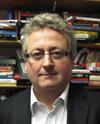Biography
 Jim Hughes is Professor of Comparative Politics, Convenor of the
Conflict Studies programme within the MSc Comparative Politics, and Director of the Conflict Research Group. In the 2011-2012 academic year, Professor Hughes will work with the Open Society Institute Foundations International Higher Education Support Program as part of its Academic Fellowship Program to mentor the development of the Political Science Department at the University of Prishtina, Kosovo.
Jim Hughes is Professor of Comparative Politics, Convenor of the
Conflict Studies programme within the MSc Comparative Politics, and Director of the Conflict Research Group. In the 2011-2012 academic year, Professor Hughes will work with the Open Society Institute Foundations International Higher Education Support Program as part of its Academic Fellowship Program to mentor the development of the Political Science Department at the University of Prishtina, Kosovo.
Professor Hughes joined the London School of Economics in 1994 to assist in the development of research and teaching in the field of national and ethnic conflict. Previously, he taught at the British universities of Surrey and Keele, and Trinity College Dublin, Ireland.
He was born and grew up in Andersonstown, the overwhelmingly Catholic and nationalist area of West Belfast. This area saw the heaviest levels of violence during the armed conflict in Northern Ireland known as the "Troubles" (1969-96). It was a heartland of communal support for the Provisional IRA and a main locus of British state securitization.
He attended St Mary's Christian Brothers Grammar School (1970-77) and took his undergraduate degree at Queen's University Belfast (1977-82). During his early years at Queen's he was active in student politics, and was an elected delegate to the NUS annual conference in 1978. His thinking was shaped most by the teaching of Frank Wright at Queen's, who was then pioneering the study of national and ethnic conflict and promoting the idea of reconciliation in Northern Ireland from a comparative perspective. He graduated with a B.A. (Combined Honours) First Class in Political Science and Ancient History, and was awarded two university prizes. Having received a scholarship for his doctoral research, he took his PhD in Soviet history at LSE (1982-7), where he was supervised by Peter Reddaway and Dominic Lieven.
He studied Russian at SSEES, and was a British Council Scholar at Moscow State University (1985-6). He had first visited the USSR as part of an NUS organised tour in 1980, and spent a month studying Russian in the Caucasus in 1983. While in Moscow he experienced the unfolding of Gorbachev's perestroika and the beginning of the collapse of the USSR.
His PhD research and subsequent numerous visits to Soviet and Russian archives, included long periods of fieldwork in Moscow and Novosibirsk (Siberia), and resulted in two monographs (published by Cambridge University Press in 1991 and Macmillan in 1996). His body of work on collectivization and dekulakization in the Soviet countryside (effectively the largest state campaign of mass killings and genocide in history) is regarded as a landmark in the study of Stalinism "from below".
During his frequent visits to Russia in the 1990s his research increasingly turned to the challenges posed by centre - regional conflicts and nationalism to federal state-building in Russia, including the violent secessionist conflict in Chechnya. He participated in USAID funded and EU-funded engagement with Russian academics, in particular on issues of federalism and centre-regional relations.
A five year ESRC-funded research excursus into the problems of EU enlargement in Eastern Europe in 1999-2004 involved years of travel and hundreds of elite interviews across almost all of the countries in the region. The result was a number of seminal articles and a pivotal monograph on EU conditionality whose critical perspective was years ahead of other similar works in the field of European Studies.
From the late 1990s he has expanded his research focus in a more comparative direction to include conflict management, political violence and terrorism more broadly, culminating in his book on the conflict in Chechnya in 2007.
In recent years Professor Hughes has become more engaged with applying the comparative lessons of other conflicts to the armed conflict that occurred in Northern Ireland. In particular, he employs the case of Northern Ireland to explore new ways of thinking about why political violence occurs, radicalization and who becomes involved, and state policy responses. He will soon begin a ground breaking research project into the question of the interaction of communities and individuals in armed conflicts, in order to better discern the reasons why some people become more actively involved in political violence and others less so, or not at all.
Professor Hughes's distinguished fellowships include a Nuffield Social Science Fellowship (1994-5) and a Jean Monnet Fellowship at the European University Institute in Florence (2001-02). He has given invited lectures at leading international universities (including Oxford, Cambridge, Princeton, Sciences-Po, European University Institute and others).
His extensive consultancy work has included providing expert advice to governments, international organizations, multinational corporations, and NGOs. He has led major research projects funded by the UK ESRC, Nuffield Foundation and European Union (INTAS, Tempus, and Sixth Framework). From 2005 to 2011 he helped to create and develop as co-editor the UNDP analytical brief 'Development and Transition' which covers the UNDP's activities in the post-communist region in Europe and Eurasia.
He was an elected member of the Executive Committee of the UK Political Studies Association (1997-2000), and a co-organiser of its 50th annual conference at LSE in 2000. He was an appointed member of the Advisory Board of the Association for the Study of Ethnicity and Nationalism (1999-2002). He is co-head of the International Advisory Board of the influential European Centre for Minority Issues based in Flensburg, Germany.
